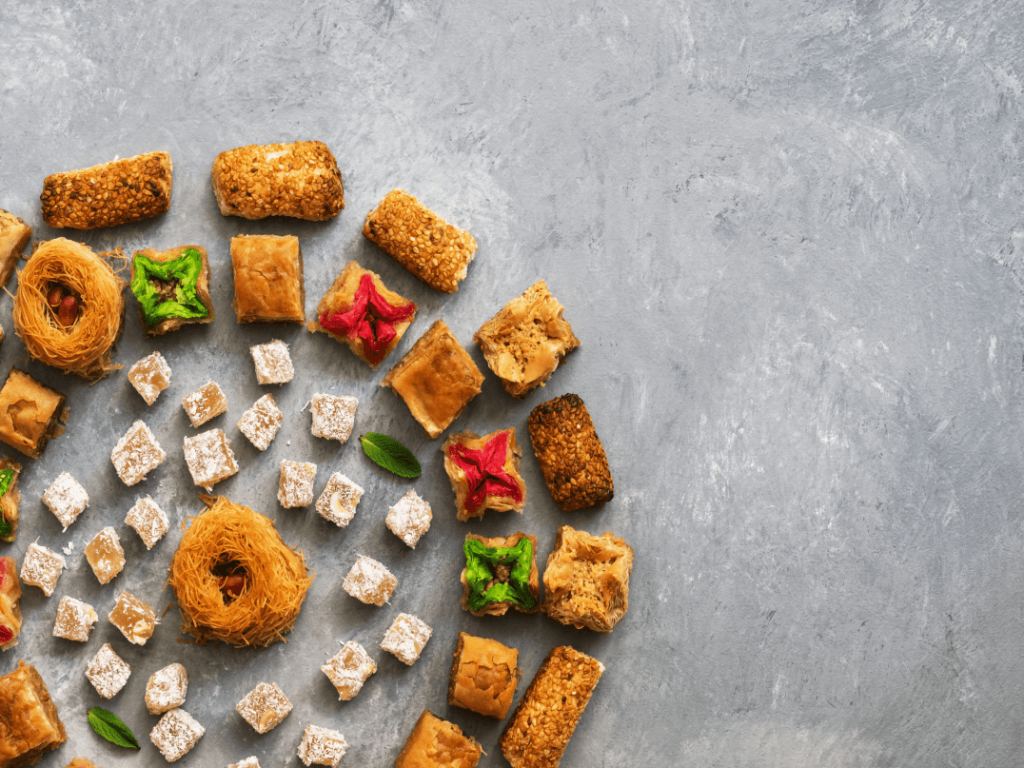Welcome to the tasty world of Arab snacks! In this blog, we’ll take you on a flavorful journey through the most popular light dishes in the Middle East. You’ll discover new tastes and simple vocabulary if you’re learning Arabic — all while enjoying healthy, delicious bites!
Why Are Arab Snacks So Special?
Snacks from the Middle East (Middle Eastern snacks) are characterized by being:
- Simple: Their ingredients are natural and readily available.
- Healthy: They rely on vegetables, legumes, and nuts.
- Delicious: Their flavors are rich and varied.
Let’s get to know some famous Arab snacks.
Man’ousheh with Thyme (Za’atar)
Description: Flatbread topped with a mix of thyme, sumac, and sesame, drizzled with olive oil.
Why we love it:
- Rich in flavor
- Quick and filling
- Contains healthy herbs and olive oil
Tabbouleh
Description: A refreshing salad made with parsley, bulgur, tomatoes, lemon juice, and mint
Why we love it:
- Full of vitamins
- Fresh and light
- A perfect healthy snack flavor from Lebanon
Hummus with Tahini
Description: Mashed chickpeas blended with tahini, garlic, and lemon
How to enjoy it:
- With warm pita bread
- As a dip with sliced veggies
- On toast for a healthy snack
Falafel
- Fried balls made from chickpeas or fava beans
- Often eaten in sandwiches or solo
- Packed with plant-based protein
Baklava
- Sweet pastry made from thin layers of dough, filled with nuts, and soaked in syrup
- Best enjoyed with Arabic coffee or tea
Mini Pastries (Fatayer, Sfeeha)
- Baked in the oven
- Filled with spinach, cheese, or minced meat
- Ideal for school lunchboxes or travel
Fattoush
Fattoush is a delicious type of salad. It contains vegetables like lettuce, tomatoes, cucumbers, and onions, along with pieces of toasted or fried bread. A delicious dressing of olive oil, lemon juice, and pomegranate molasses is added to the fattoush. It’s a very refreshing dish.
Labneh
Labneh is a creamy cheese made from yogurt. It has a slightly tangy and delightful taste. You can eat labneh with bread, olives, and olive oil. It makes an excellent breakfast or a light snack.
For Better Health:
- Labneh is rich in protein and calcium.
- You can add herbs like za’atar or mint.
Nuts
Nuts are a healthy and nutritious snack. Almonds, pistachios, and walnuts are all types found in the Middle East. Healthy snack flavors in Lebanon (healthy snack flavors Lebanon) are very famous, especially pistachios. You can eat nuts on their own or add them to salads and desserts.
Muhammara
Muhammara is a delicious and unique sauce or dip from Syria. It’s made from roasted red peppers, walnuts, breadcrumbs, and pomegranate molasses. Its flavor combines a mix of sweetness, tanginess, and a slight heat. You can eat it with bread or use it as a sauce for grilled foods.
Grape Leaves
Grape leaves is a traditional dish made from fresh or preserved grape leaves, which are stuffed with a mixture of rice, vegetables, and sometimes minced meat. The leaves are carefully rolled and then cooked until they’re tender. It can be eaten cold or warm and makes a nutritious and filling snack.
Kibbeh
Kibbeh is one of the most famous dishes in the Levant. It’s made from fine bulgur (a type of wheat) and is filled with minced meat, onions, and pine nuts. Kibbeh can be deep-fried until crispy or baked in the oven. There are other types of kibbeh as well, like potato kibbeh and pumpkin kibbeh.
Lentil Chips
Lentil chips are a modern and popular snack. They’re made from lentils and have natural flavorings added to them. This type of chip is considered a healthier alternative to potato chips because it’s rich in protein and fiber.
Halloumi Cheese
Halloumi cheese is originally from Cyprus but is very popular in the Middle East. It can be grilled or fried without melting, which makes it perfect for sandwiches or as a snack with bread and tomatoes. It has a salty, strong flavor and a slightly rubbery texture.
Healthy Snack Flavor Ideas
Looking for healthy snack flavors that still feel indulgent? Try these Arabic-inspired ideas:
- Carrot and cucumber sticks with hummus
- Dates stuffed with almonds or walnuts
- Yogurt with mint and olive oil
- White cheese cubes with olives
Bonus for Arabic Learners: Vocabulary
| Arabic Word | English Meaning |
|---|---|
| خفيفة (khafīfa) | Light (not heavy) |
| صحية (siḥḥiyya) | Healthy |
| نكهة (nakha) | Flavor |
| مقرمش (muqarmish) | Crunchy |
| مغذي (mughadhdhi) | Nutritious |
| طازج (ṭāzaj) | Fresh |
Try using them when you eat! For example:
“I ate crunchy falafel with fresh salad.” — “أكلتُ فلافل مقرمشة مع سلطة طازجة.” /ʼakaltu falaafil muqarmishah maʻ salaTah Taazajah/
Conclusion
Now that you’ve explored this delicious world of Arab snacks, we hope you feel inspired to try them. From the rich flavors of a hearty Middle Eastern snack like hummus to the fresh taste of healthy snack flavors from Lebanon like tabbouleh, there’s a snack for every mood and occasion.
Remember, exploring these foods is a great way to connect with Arab culture and practice your new vocabulary. So go ahead, find a new favorite, and share it with a friend. Enjoy your delicious journey!
If you wish to learn more about the Arabic language, download our Arabic learning app.



